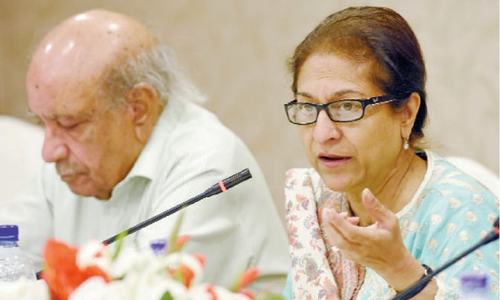ISLAMABAD: Women selected on the reserved seats of the National Assembly opposed a bill seeking a quota for women judges in the Islamabad High Court (IHC).
“The Islamabad High Court Act (Amendment) Bill 2016” was introduced by Nikhat Shakeel Khan of the Muttahida Qaumi Movement (MQM), which the National Assembly Standing Committee on Law and Justice examined on Monday.
The mover of the bill, who was also selected on the quota reserved for women, proposed an amendment to Sub-section 1 of section 3 of the Islamabad High Court Act, which is related to the appointment of judges.
Ms Khan suggested reserving seats for women to be appointed as judges in the high court.
Women selected on reserved seats also oppose bill saying judges should be appointed strictly on merit
However, the women lawmakers selected on reserved seats belonging to the ruling PML-N and the opposition PPP insisted that the appointment of judges should be made strictly on merit.
MNA Shagufta Jumani of the PPP said vacant seats of judges in the superior judiciary should be filled strictly on merit rather than under the quota system. She said reserving special seats for women judges would promote nepotism.
Opposing the amendment, Kiran Haider of the PML-N said Asma Jahangir and retired Justice Nasira Iqbal may be the role models for young women lawyers.
“Competent woman does not need any quota to prove their proficiency,” she said.
Asiya Naz Tanoli of the PML-N also opposed the proposal. “There is a need to examine this bill in accordance with the Sharia law,” she suggested.
Mahmood Bashir Virk, the chairman of the committee, added that it was not an issue of gender discrimination but a matter of professionalism.
“There is not a single precedent of special quota for women judges in India, Europe or the United States,” he maintained.
“We are not supposed to distribute quotas among different segments of society. But tomorrow such a quota may be demanded for provincial high courts as well” he added.
Secretary Ministry of Law and Justice Karamat Niazi informed the committee that the law did not restrict appointment of women as judges of the high court.
He explained that the chief justice of high court concerned forwarded names of eminent lawyers or district and sessions judges to the Judicial Commission of Pakistan (JCP). The commission, headed by the chief justice of Pakistan, recommends certain individuals and the parliamentary committee endorses the nominations and then the president appoints the judges of the superior courts.
According to Mr Niazi, at present, three women were working as judges in the Lahore High Court, one each in Sindh High Court and Peshawar High Court, while there is no representation of women in the IHC and Balochistan High Court.
Member of the committee, retired Justice Iftikhar Ahmed Cheema, opined that if seats were reserved for women, their appointments would be made by compromising on the experience and capability.
The only member who supported the proposed amendment was S. A. Iqbal Qadri of the MQM. He recommended that the quota for women judges should be introduced to eliminate gender inequality.
The chairman of the committee, however, ruled that the proposed amendment would create complications and disapproved the bill.
Published in Dawn, November 8th, 2016














































